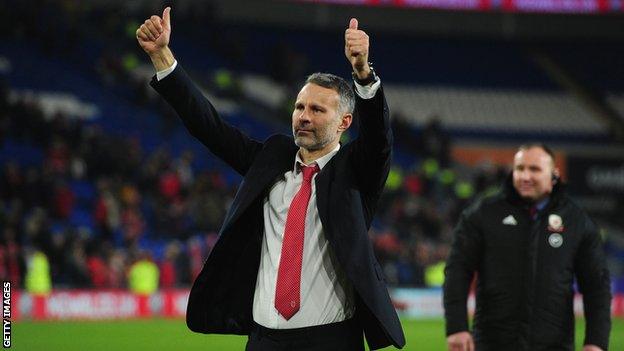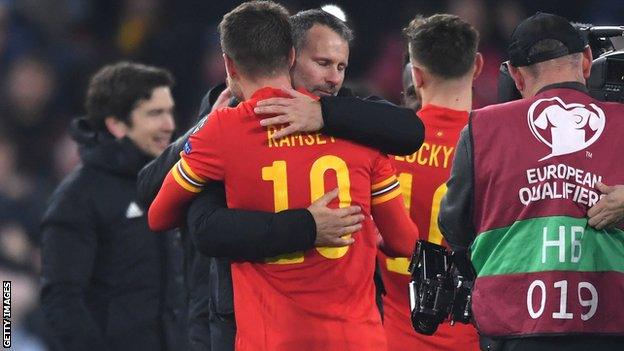Ryan Giggs: Has Wales boss won over fans with Euro 2020 qualification?
- Published
- comments

Ryan Giggs won 64 Wales caps between 1991 and 2007
After Wales slumped to defeat in Hungary in June, Ryan Giggs was ashen-faced when he walked in for his post-match news conference, his team's hopes of qualifying for Euro 2020 seemingly in tatters.
Giggs' stock was already low among the many Wales fans who were unhappy with his appointment in January 2018 and now furious that his first qualifying campaign looked destined for dismal failure.
They did not want him in the first place. In their eyes, Giggs was not committed enough to Wales as a player and he was not the man to build on the success of his predecessor, Chris Coleman.
The detractors felt vindicated in Budapest. With three points from their first three matches, Wales were staring into the abyss.
But when the final whistle blew at Cardiff City Stadium on Tuesday, the scene could scarcely have been more different.
Hungary were the opponents again but, this time, it was Wales who were victorious - and emphatically so as they secured their place at Euro 2020.
Giggs is not usually one to let his feelings show, but on this occasion he let himself go, embracing his players and staff on the pitch before sharing the moment with the supporters.
"One of the greatest nights of my life," he said afterwards, beaming.

Ryan Giggs hugs Aaron Ramsey, the scorer of both Wales goals in their 2-0 win over Hungary
Winning over his critics
On the day he was appointed in January last year, Giggs said the only way he would convince the sceptics among Wales' fans would be by winning games.
Surely guiding Wales to Euro 2020 - only a third major tournament in their history - would go some way to doing that?
"I hope so. I'm struggling if it doesn't," Giggs said with a laugh while also praising Coleman for his "fantastic achievement" that "showed the way".
Giggs added: "I asked the players who had been there and done it to climb that mountain again. It's not easy to do that.
"I set out to qualify for a major championship but, more than that, to leave Welsh football in a better state than when I took over, which wasn't going to be easy because of what 'Cookie' [Coleman] achieved."
As someone whose default mode is to deflect attention from himself and to focus on his players, Giggs was anxious not to make Wales' achievement of qualifying for Euro 2020 about him.
But if the manager warranted criticism for the mistakes leading up to June's bleakness in Budapest, now he deserved credit for overseeing an extraordinary transformation.
"It wasn't a great place we were in after the summer, difficult circumstances with two away games and coming away with nothing," Giggs said.
"There was no room for error, and then we play against Azerbaijan, don't produce a great performance but dig out a result.
"From then really, we have been brilliant."
A greater achievement than 2016?

Wales dealt with injuries to key players throughout the qualifying campaign
There may have been a few raised eyebrows when Gareth Bale, such an influential figure in Wales' run to the Euro 2016 semi-finals, suggested on the eve of the Hungary match that qualifying this time "might be a bit more impressive" than it was three years ago.
He did not say so lightly.
Qualifying for Euro 2016 was catharsis on a grand scale for Wales, ending a 58-year absence from major tournaments and banishing half a century of agonising near misses.
The players and their charismatic manager, Coleman, instantly acquired hero status - and that was before they went on to reach the semi-finals in France.
That campaign transformed Welsh football, which still benefits from its afterglow in the form of a growing fanbase, improved world ranking and more favourable draws in qualifying groups.
And yet, Bale offered his opinion on the eve of beating Hungary with good reason.
While recent success has given the senior members of Wales' squad precious tournament experience and bred confidence among younger emerging players, it has also raised expectations for Giggs and his side.
And whereas Coleman had an often fully fit squad which meant he was able to regularly select pivotal players such as Bale and Aaron Ramsey, Giggs' talent pool has been severely hindered by injuries.
Reaching the Euros 'special' Ramsey
Ramsey had not featured at all in this campaign until coming on as a substitute in Azerbaijan on Saturday, while Wales' reigning player of the year David Brooks has not played since June.
Then there is Bale.
The Real Madrid forward peaked under Coleman. Of Wales' 11 goals in their Euro 2016 qualifying campaign, Bale scored seven and assisted two.
Since Giggs has taken over, however, Bale has struggled for form and fitness - even if playing for Wales remains a form of solace for the 30-year-old, respite from the constant criticism he encounters at Real.
Giggs has had to ease the goalscoring burden on Bale, while also phasing out other members of Wales' 'golden generation', such as Ashley Williams and Chris Gunter, totems of the Euro 2016 campaign but approaching their twilight years.
It has not been a straightforward process, as demonstrated by a campaign which Giggs and Bale admit themselves has been "topsy-turvy".
But like Coleman, who oversaw long losing runs and a shaky start even to Euro 2016 qualifying, Giggs has improved as the campaign has worn on, learning from his mistakes and evolving as a manager.
He also wants to ensure he is laying strong foundations for future success and, after under two years in the job, he has handed debuts to 15 different players.
"This is just the beginning," Giggs says.
"We have seen a lot of young players over the last 18 months and they can get better, they can definitely get better."
Giggs knows he must accomplish extraordinary feats to be given anything like the recognition his predecessor enjoyed.
Having led Wales to a first major tournament for a generation, Coleman's place in Welsh footballing folklore is assured.
Even if he could not guide the team to last year's World Cup, Coleman's Euro 2016 legacy meant he would be a tough act to follow.
Succeeding such a popular figurehead was always going to be particularly difficult for Giggs, given how the former captain was never able to fully win over large sections of the Welsh support during his playing career.
But he knew that when he took the job. Giggs said himself the only way he would convert the doubters would be by winning matches.
Now he has started doing that when it matters most, he may be changing perceptions.